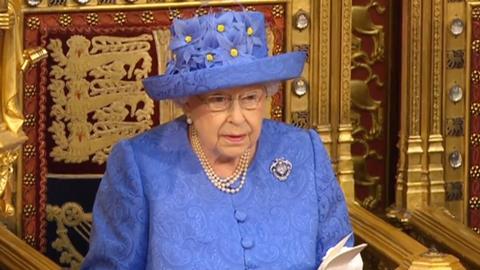Fresh reforms to personal injury claims are back on the agenda following today’s Queen’s speech. The government's slimmed-down wishlist of legislation includes a Civil Liability Bill to address the ‘compensation culture’ around motor insurance claims.
The Queen’s speech confirmed legislation will ‘modernise the courts system and help reduce motor insurance premiums’. This will include primary legislation to enable the creation of the 'Online Solutions Court’ to handle small civil claims.
The compensation culture pledge is likely to be similar to the whiplash elements of the Prisons and Courts Bill, which ran out of parliamentary time before the snap election, but broken up into different bills.
The Civil Liability Bill will ban offers to settle claims without the support of medical evidence and introduce a new fixed tariff of compensation for whiplash injuries lasting up to two years. The briefing notes for this bill state the legislation will 'crack down on fraudulent whiplash claims' and reduce motor insurance premiums by £35 a year.
A Courts Bill will reform the courts system in England and Wales and embrace more modern technology. This is likely to herald the online court for civil claims, with the government saying it will introduce digital services to allow businesses to pursue their cases quickly, enabling them to recover debts more easily. The system will be designed to work without lawyers. The bill will also establish a process for online gulty pleas for people charged with non-imprisonable offences.
Legislation will also end direct cross-examination of domestic violence by their alleged perpetrators in the family courts and allow more victims to participate in trials without having to meet their alleged assailant face-to-face.
The government pledges to provide a 'better working environment' for judges, allowing more leadership positions in the judiciary to be offered on a fixed term basis, and enabling judges to be deployed more flexibly.
A financial guidance and claims bill would tighten the regulation of claims management companies, transferring regulatory responsibility to the Financial Conduct Authority and giving it the power to cap fees.
Measures will be introduced to create an independent public advocate to act for bereaved families after a public disaster and support them at public inquests.
The issue of fixed costs in clinical negligence claims is not addressed, but a draft patient safety bill will be introduced to improve how the NHS investigates mistakes and encourages staff to share information freely.
This measure will 'embed a culture of learning and safety improvement across the NHS' and ensure serious incidents can be investigated by an independent and impartial body 'without the need for expensive, lawyer-led inquiries where that is unnecessary'.
As expected the speech also promised a data protection bill, which will bring domestic legislation into line with the EU General Data Protection Regulation, which comes in to force in May next year. A new digital charter will be brought forward 'to ensure that the United Kingdom is the safest place to be online'.
A Goods Mortgage Bill will implement recommendations from the Law Commission to update Victorian-era law on borrowers who have taken out a mortgage on goods that they own, such as their car (a ‘logbook loan’).
The speech featured a reduced number of manifesto pledges due to the Conservatives’ struggles to secure a majority following talks with the Democratic Unionist Party of Northern Ireland. One casualty appears to be the manifesto proposal to merge the Serious Fraud Office and the National Crime Agency, which does not appear in the speech.
This will be the last Queen’s speech until 2019, as Brexit talks take precedence next year. The Queen's speech promises a bill will be introduced to repeal the European Communities Act, complemented by legislation to establish national policies on immigration, international sanctions, nuclear safeguards, agriculture and fisheries.




























44 Readers' comments